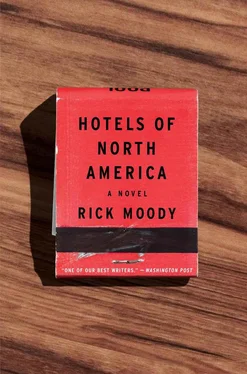Marina O’Shea, for her part, had more than a few things to say about Reginald Morse. I had sent this manuscript to Marina, and it was her contention that Morse, like Cervantes, was missing a hand or was otherwise seriously disabled, because, as she noticed, there were few, if any, descriptions of Morse’s hands in his reviews, and when the little elegies about Morse’s daughter appeared in the book, there were no descriptions of throwing this child up into the air. Marina observed — and surely here she was speaking from the vantage point of a lifetime of balletic experiences — that bearing a daughter aloft is one of life’s most important pastimes, and sometimes fathers will throw a daughter into the air simply to try to restore themselves to spiritual equilibrium. And so unless Morse was missing a hand, Marina felt, or was otherwise disabled, there was not a chance that he had failed to engage in this curative activity.
Before I could write back to take issue with her theory, however, Marina abruptly ceased to be, following an aneurysm that spun itself into a coma (from which she did not awake), and her nephew, who made contact with some of her many correspondents, later wrote me to ask if I wanted some portion of her library. It turned out she owned a great number of books.
With Marina’s death, it became clear that my need to know more about the specific biography of Reginald Edward Morse would ultimately be frustrated. I had exhausted most of my leads. Perhaps Reginald Morse, the fellow who wrote these lines, didn’t want to be located, didn’t want to be more than the posts you have read, and his need to conceal his physical self is a set of instructions about how the work is to be consumed, namely, that it is meant to be read for what it has to say about the world, not for what it has to say about Reginald Edward Morse. Maybe it would be useful to let Morse go, to follow the words instead. After all, men will let us down, but the work is fixed on the page.
In pursuit of the meaning of Morse’s posts, I determined that in order to understand the associative breadth and the improvisatory immediacy of this literary work, I should experience some of the hotels Morse wrote about. I should try to know hotel life the way Morse knew it. I will add, in a spirit of full disclosure, that I personally like really good hotels. Prior to undertaking this assignment as the writer of the afterword to R. E. Morse’s work, I had stayed in exactly two of the hotels in this book — the Plaza Hotel (of New York City) and the Hotel Whitcomb (of San Francisco). It is not so often, these days, that I get to stay in a hotel. When I do, I favor availing myself of what Morse refers to as amenities. I like to get a massage at a hotel; I like to get room service; and I will rifle a minibar for every last candy bar contained within. I do not refuse turn-down service. There really is nothing like having someone walk into your room in the evening hours to leave a foil-wrapped mint on your pillow.
Given that I have these feelings about hotel life — that hotel life should be a pampering experience — it was hard to get up my courage to stay in the Presidents’ City Inn of Quincy, Massachusetts, one of the worst-rated hotels in the collected writings of Reginald Morse. (And this is as good a place as any to note that there is a great density of two-star ratings among Morse’s reviews. So many that I had thought, at one time, that the publisher really ought to have entitled this book ★★, or perhaps ★★1/2. Furthermore, with the elusiveness of Reginald Morse in mind, it seems important to note that, as Michelle Perry told me, the legal department of the North American Society of Hoteliers and Innkeepers insisted on the inclusion of the words a novel on this work.) It happened that I was teaching for a week at the Lexington Academy, a secondary school in Lexington, Massachusetts. I had a very good time teaching at Lexington, which was a revelation, because my own teenage years at secondary school were characterized by emotional distress. The modern boarding-school student is better equipped than I was, more patient, more ambitious. I would go so far as to say that I enjoyed Lexington. The teaching paid well, and the school was covering my lodging. They were therefore understandably confused when I elected to stay at the Presidents’ City Inn of Quincy, which is after all a known drug location. I claimed that I felt passionately about saving the school a little money and that I couldn’t bring myself to stick them with a bill from the Ritz.
Unsurprisingly, I had a bad night at the Presidents’ City Inn. First, my guitar, stored in the trunk of my BMW, was stolen. The trunk was wrenched open, and the guitar removed. It was my travel guitar and not of tremendous value, but it was stolen nonetheless. Meanwhile, the sound of monotonous computerized drumming from sport-utility vehicles with tinted windows was almost constant on the block in Quincy. As a result, I was more worried about getting caught in gang-related crossfire than I was about getting my guitar back. I had to call and text my wife repeatedly to tell her that I was still okay. I did not stay past the first night. There was a Courtyard by Marriott not far from the school.
So I can verify that the Presidents’ City Inn is, indeed, a wreck of an establishment, and it’s a miracle that there are paying clients who are willing, like the fly alighting on the transverse of the spiderweb, to put their cars in P in that parking lot and walk over to the bunker where one registers. Morse did so, and got one of his darkest reviews out of it. I didn’t feel that the experience of staying there made me want to write, but I did feel, oddly enough, the emanations of Morse’s prose style. This was a place he had been, after all, this man who receded from his own work like radiation from the blast site, and I knew, at this address, exactly how he had passed his night. I could have gone on and stayed at a few of the choicer residences described in these pages, like the Emerald Campsites, or the Norse Motel, or the bed-and-breakfast that is last in this sequence, but I would have learned only what is obvious, that this is not a book about hotels but a collection of writings about what it means to be alone.
The context of the work is crucial too, by which I mean its online publication, the contemporary world of the fast, cheap, and out of control. Despite Morse’s brief infamy in that world, he’s not even at the top of the comments section anymore. He’s down in the archive now, deep in the space of the digital, in that sequence of nothings and somethings, a ghost inside a ghost of a machine. We like him, ultimately, because he’s like us, but also not like us. He’s a shadow, an imago, an ephemeral avatar of a human being, a voice in the wilderness whose work will never be troubled by an actual author appearing on daytime television. Morse is fragmentary, in that the pieces he wrote are themselves fragmentary, episodic, nonlinear, ending with new love simply because that is where he stopped.
That said, there’s a danger in saying that this work is about only solitude and loneliness and the tendency of modern contrivances to aggravate our feelings of separateness. Maybe in the end I see in these pages exactly what I want to see, and maybe Reginald Morse has some other perfectly good reason for giving up reviewing and vanishing. Maybe Morse has taken a job as a motivational speaker at a college or university in the middle of the country and is better paid and no longer needs to write hotel reviews. Maybe his lover, K., has become his wife, and they have a new child, and he no longer has time to write these little screeds. Maybe he simply doesn’t wish to travel anymore. Maybe he is tending to his aged mother, or maybe he has taken up gardening, has humus beneath his fingernails, and his daily life is now the antithesis of everything hip and Internet-related. We do not know. Our insistence on knowing is the limit of what we know about ourselves.
Читать дальше












